HUDSON STREET PRESS
Published by the Penguin Group
Penguin Group (USA) LLC
375 Hudson Street
New York, New York 10014

USA | Canada | UK | Ireland | Australia | New Zealand | India | South Africa | China
penguin.com
A Penguin Random House Company
First published by Hudson Street Press, a member of Penguin Group (USA) LLC, 2014
Copyright 2014 by Carl J. Lavie
Penguin supports copyright. Copyright fuels creativity, encourages diverse voices, promotes free speech, and creates a vibrant culture. Thank you for buying an authorized edition of this book and for complying with copyright laws by not reproducing, scanning, or distributing any part of it in any form without permission. You are supporting writers and allowing Penguin to continue to publish books for every reader.
Excerpts from the article The Thin Mans Diabetes by Jeff OConnell were originally published in the April 2008 issue of Mens Health magazine and are used with express written permission of that articles copyright owner, Rodale, Inc. All rights reserved.
 REGISTERED TRADEMARKMARCA REGISTRADA
REGISTERED TRADEMARKMARCA REGISTRADA
LIBRARY OF CONGRESS CATALOGING-IN-PUBLICATION DATA
Lavie, Carl J., author.
The obesity paradox : when thinner means sicker and heavier means healthier / Carl J. Lavie, M.D. ; with Kristin Loberg.
pages cm
Includes bibliographical references and index.
ISBN 978-1-59463-244-0
ISBN 978-0-698-14851-2 (eBook)
1. ObesityHealth aspects. 2. Overweight personsHealth and hygiene. 3. Human bodyComposition. 4. Weight lossPhysiological aspects. I. Loberg, Kristin, author. II. Title.
RA645.O23L38 2014
616.3'98dc23 2013045483
Neither the publisher nor the author is engaged in rendering professional advice or services to the individual reader. The ideas, procedures, and suggestions contained in this book are not intended as a substitute for consulting with your physician. All matters regarding your health require medical supervision. Neither the author nor the publisher shall be liable or responsible for any loss or damage allegedly arising from any information or suggestion in this book.
While the author has made every effort to provide accurate telephone numbers, Internet addresses, and other contact information at the time of publication, neither the publisher nor the author assumes any responsibility for errors or for changes that occur after publication. Further, publisher does not have any control over and does not assume any responsibility for author or third-party Web sites or their content.
Version_1
To the pursuers of health and happiness... no matter how much you weigh.
And to anyone who has felt tyrannized by matters of weight, dieted to no avail, and searched for
the secret to longevity.
Paradox: a statement that is seemingly contradictory or opposed to common sense and yet is perhaps true.
Contents
Introduction:
The Miseducation of Fat
T ake a moment to consider what the word fat brings to mind. This small, three-letter word looms large in our collective consciousness today, arguably as powerful in our vocabulary as the word no. And indeed, these two words seemingly share the same negative vibe. For many, fat conjures vivid images of unhealthiness, greasy foodstuffs, fleshy folds, and even ugliness, slovenliness, and gluttony. We rarely see fat individuals gracing the covers of popular magazines. In fact, we see the absolute opposite, as if extreme thinness were the definition of beauty and health.
I dont think any one of us can get through the day without this word creeping into our minds, however subliminally. We are bombarded with reminders that we live in a society in which more than two-thirds of us are overweight or obese. We are told to lose weight everywhere we look, from the packaging of food products that market their brands based on low calories, weight loss promises, and other health claims, to the phalanx of media stories, books, and articles that relentlessly cover the obesity epidemic and try to show us how to trim down. We know its a problem. Most everyone also has a clear idea about what excess fat does to harm the body. It wreaks havoc on our metabolism, opens the door to diabetes and heart disease, among other dangerous health conditions, and basically increases our risk of dying young.
But heres a question that we must ask ourselves: Have we demonized fat to our own detriment? Much in the way a glass of wine a day has been proven to impart health benefits, but four or five glasses puts us at risk for an untold number of health challenges, can body fat in the right amount (and more than what youre probably currently striving for) be exactly what we need to live long and enjoy the highest quality of life possible? Put simply, has our modern culture duped us into thinking excess body fat is bad no matter what and should be burned away at all costs?
Im here to tell you that fatness has been sorely misunderstood and wrongly portrayed in many respects. By the same token, endurance sports and rigorous exercise have been unjustly glorified. Similar to how the famous French paradox points to an inverse relationship between the incidence of coronary heart disease and the consumption of saturated fats, the so-called obesity paradox points to an inverse relationship between body fat and risk of death in many cases. While its well documented that obesity has contributed to our challenges with chronic illness, and that exercise is often a surefire antidote, no one has explained some of the stranger cause-and-effect reactions going on deep within our cellular makeup that have everything to do with fats positive side. Its pretty straightforward: Fat isnt always bad. And exercise isnt always good.
These are hardly inconsequential findings: The fact that body fat protects us in a lot of surprising waysnot to mention may help us live long after a grim diagnosis or heart attackhas been quietly circulating in our most prestigious medical literature for the past few years. And so has the certainty that too much exercise can shorten our life span. I have led the charge in some of these findings through my work as a cardiologist (and avid runner) with a keen interest in the relationships among the subjects of the heart, fat, obesity, exercise, disease, and longevity. The information that my research, alongside that of many others, has amassed in this realm is truly staggering and begs to be known by the public, which is increasingly deceived by an anti-fat, pro-exercise industry. It has also led doctors and scientists like me to question so much about what we consider to be healthy.
When I asked you to think about the word fat at the beginning of the introduction, did anything positive and beautiful come to mind? Now, wouldnt it be great to be able to relax more about issues around weight? Dont get me wrong: I wont endorse a fattening lifestyle, whereby I recommend avoiding treadmills and embracing daily cinnamon buns. Im not promoting fatness, and I wont be suggesting that people of normal weight start intentionally packing on the pounds. The message is a bit subtler than that, but I trust youll find it equally as powerful and liberating. And if I had to sum up the main message of this book, it would be this: Contrary to what the popular media broadcasts and what the general medical wisdom has you believing, its not doomsday to have extra fat on you, especially if you maintain a certain level of fitness (and Ill explain exactly what fitness means, for its not being able to run a six-minute mile or commit to an exercise regimen on a par with an athletes). For millions of people categorized as overweight or mildly obese by the most commonly used standard todaythe body mass index, or BMIthe achievement of optimal health may mean staying exactly where you are in terms of weight. Thats right: You dont have to lose weight and you dont have to set your sights on getting your BMI down to less than 25. You may, in fact, be much better off sustaining a BMI of between 25 and 30, or even slightly above that, depending on your body type. I will show you why and how this is possible. And if you do choose to lose weight, make sure youre doing it for the right reasons, a topic well also discuss.

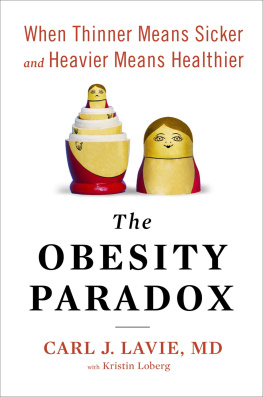
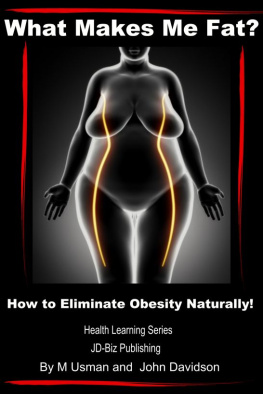

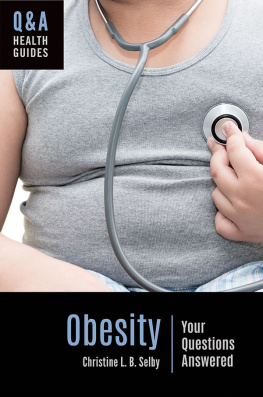
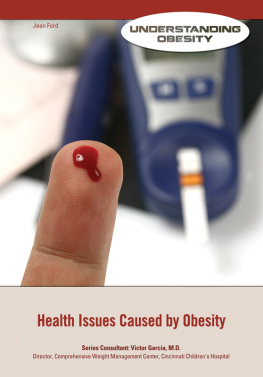
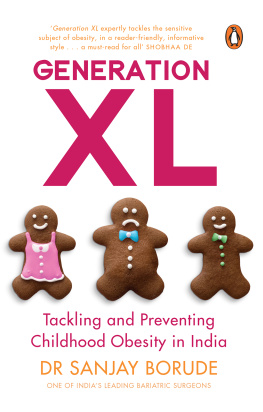

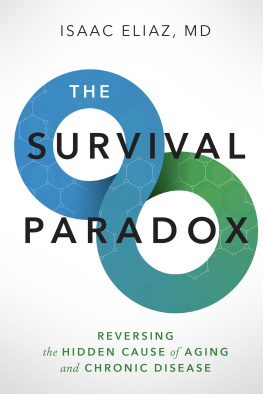

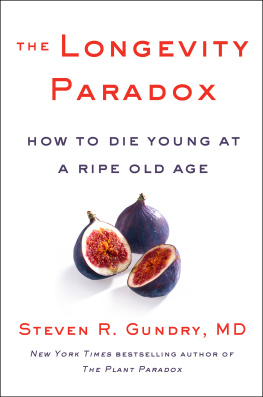
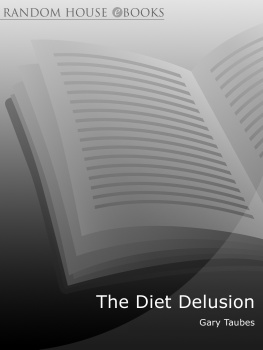
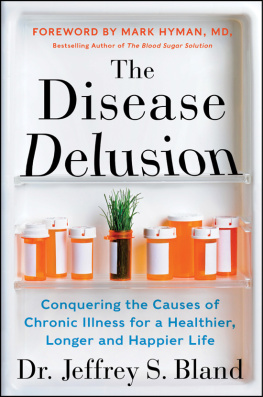



 REGISTERED TRADEMARKMARCA REGISTRADA
REGISTERED TRADEMARKMARCA REGISTRADA